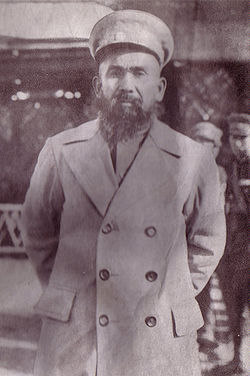Khoja Niyaz
| Hoja-Niyaz | |
|---|---|

Hoja Niyaz
|
|
| President of the First East Turkestan Republic | |
|
In office 1933 – April 1934 |
|
| Personal details | |
| Born | 1889 Kumul |
| Died | 1941 Dihua (Urumqi) |
| Nationality | Republic of China |
| Religion | Islam |
Hoja Niyaz Haji also Xoja Niyaz Haji (Uyghur: خوجا نىياز ھاجى, ULY: Xoja Niyaz Haji, خوجا نياز حاجی, Chinese: 和加·尼牙孜·阿吉; pinyin: Héjiā Níyázī Ājí) (1889 – 1941) was a Uyghur independence movement leader who led several rebellions in Xinjiang against the Kumul Khanate, the Chinese governor Jin Shuren, and later the Hui warlord Ma Chung-ying. He is best remembered as the first and only president of the short-lived Turkish Islamic Republic of Eastern Turkestan (or First East Turkestan Republic) from early 1933 until the republic's defeat in 1934.
Born in 1889 in a small mountainous village in Kumul Prefecture, Xinjiang, Hoja Niyaz participated in his first rebellion at the age 18, joining a 1907 uprising of peasants and mountaineers against Shah Mahsut, hereditary ruler of Kumul (who was allowed semi-autonomous rule by Qing China). After being defeated, he fled to the Turpan region, where he entered "Astana," religious school, and became acquainted with future prominent Uyghur Turpan revolutionary leaders, brothers Maksut and Mahmut Muhiti. After one year of studying, he left Turpan and went on the Hajj to Mecca, adding to his name the title "Hajji".
...
Wikipedia
